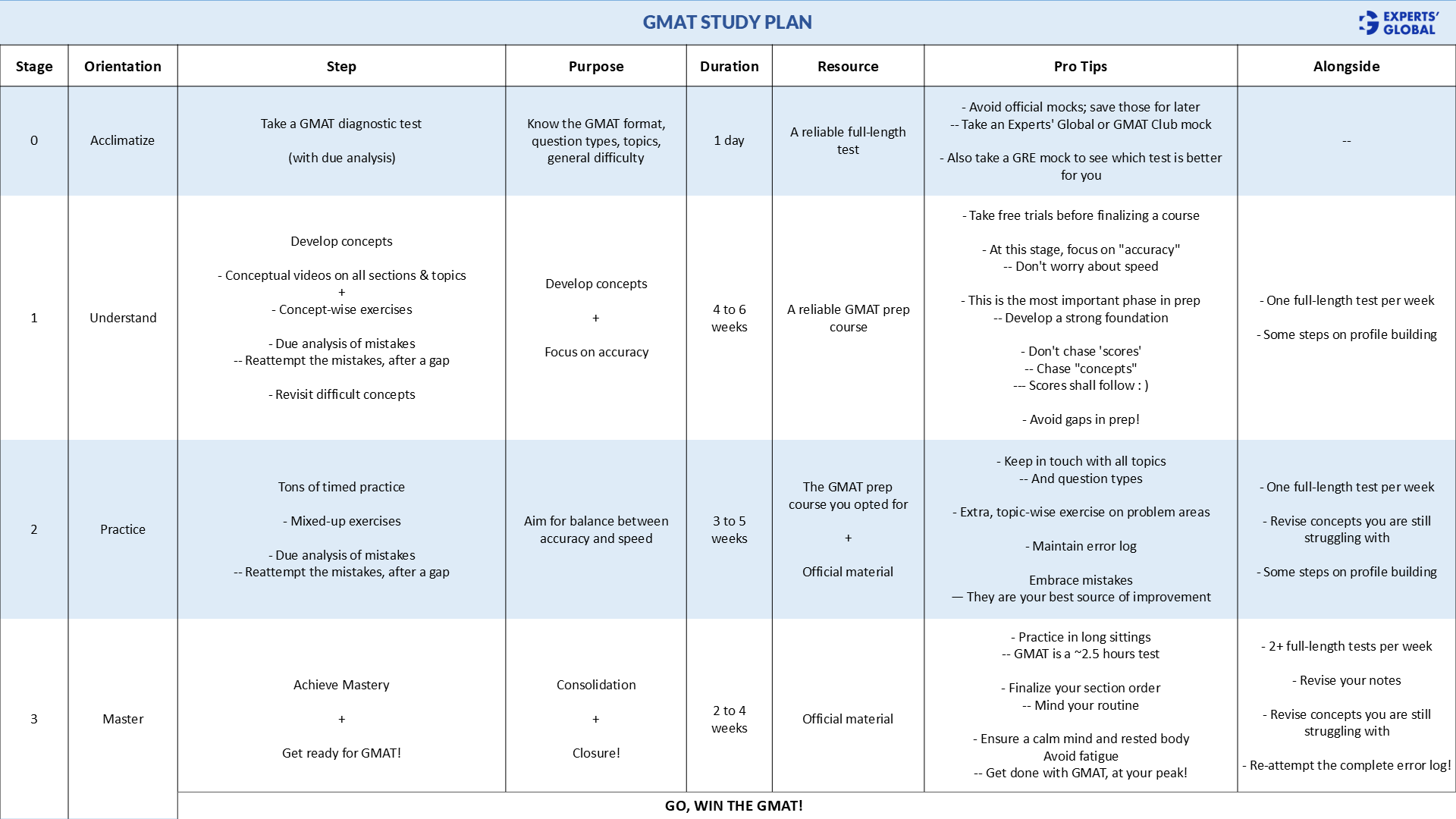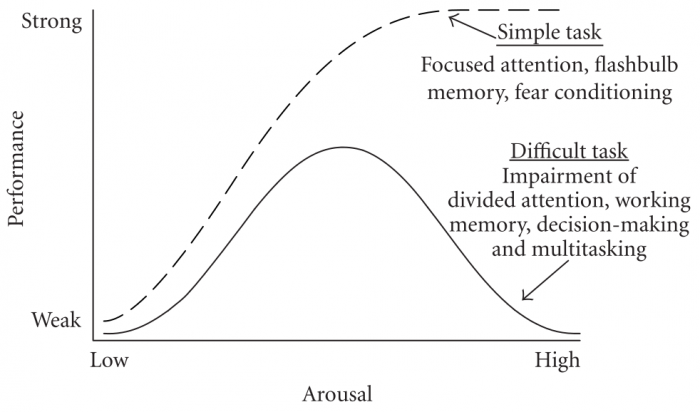Invest 30 seconds...
...for what may lead to a life altering association!
Help Line
- +91.8800.2828.00 (IND)
- 1030-1830 Hrs IST, Mon-Sat
- support@expertsglobal.com
...for what may lead to a life altering association!


Most candidates preparing for GMAT with a full-time job require around 3 to 4 months. The exact duration varies by starting point, target score, and study hours per week. Some achieve readiness in 5 weeks, while others may require 5 months or more.
Wish to know you starting level on GMAT? Take a free full-length GMAT diagnostic test!
GMAT preparation is not only about how to study but also how long to study. The time you devote must balance discipline, stamina, and smart planning. While some candidates can reach their target score in a shorter period, most require at least three months of consistent effort, and many benefit from closer to six months. A longer preparation window ensures time for conceptual clarity, structured practice, and final mastery. This article outlines a four-stage approach for GMAT prep: acclimatize, understand, practice, and master. It explains how much time each stage usually requires. By following these timelines, candidates from any background can plan their preparation with confidence.
A balanced approach makes the best use of your preparation months. Dedicate 40–50 percent of the time to strengthening concepts and practicing topic-specific questions through reliable resources, 30–40 percent to rigorous practice with official material, and 20–30 percent to review and consolidation. Along the way, take regular GMAT mock tests, revisit weaker areas, and analyze errors carefully to maximize progress.

Before setting a schedule, it is important to adopt the right mindset about preparation time. Keep the following principles in mind:
As we strive to meet responsibilities and reach goals, we often overlook how stress shapes performance. Psychologists explain this through the inverted-U model by Robert Yerkes and John Dodson. In the early stages, stress energizes and sharpens focus, improving performance. However, when stress persists unchecked, it begins to distract, gradually reducing efficiency. Managed well, moderate stress can serve as a powerful motivator, driving consistent effort and stronger results.

The original Yerkes-Dodson Law
Image Source: Wikipedia
GMAT preparation is not only about concepts and practice but also about developing the mental strength and composure that will serve you throughout your career. Some candidates may feel moments of pressure, especially when progress appears slow. This is natural, and it should be seen as an opportunity to build patience, persistence, and resilience. A little stress can even energize your efforts and sharpen focus. What matters is learning how to channel that energy productively.
Remember, GMAT preparation is not a burden to endure. It is an engaging process that strengthens skills you will use for life: logical reasoning, time management, and the ability to stay composed under pressure. Occasional ups and downs in mock scores do not reflect lack of ability, but rather the normal rhythm of a demanding and rewarding journey.
Short pauses during study sessions refresh your mind and prevent fatigue. Even five minutes of stretching or stepping away from the desk can restore focus.
Instead of worrying about every score jump or drop, focus on how your accuracy, speed, and confidence are improving over weeks.
Sleep well, eat balanced meals, and stay physically active. A strong body supports a strong mind.
Remind yourself why you are preparing: admission to a great business school, scholarships, and the skills that will empower your career. Keeping the larger vision in mind turns preparation into a meaningful journey.
Simple breathing exercises, mindfulness practices, or even listening to calming music can help regulate energy and keep stress at healthy levels.
A good study week, an improved score on a section, or even consistency in practice deserves recognition. Small celebrations keep motivation alive.
The GMAT is a computer-adaptive exam with three equally weighted sections: Quantitative Reasoning, Verbal Reasoning, and Data Insights. It lasts 2 hours 15 minutes, with an optional 10-minute break, and is scored from 205 to 805.
Spend one or two days in this stage. Take a diagnostic test under realistic conditions to understand format, pacing, and pressure. This sets your starting score and clarifies how much preparation time you are likely to need.
This stage is about building a solid conceptual base. Most candidates require four to six weeks to cover fundamentals thoroughly, though some may need longer if their basics are weak.
Enrolling in a structured course can save time by providing clarity, curated questions, and a guided study plan. A good course ensures that weeks are not wasted in searching for or sequencing material.
Practice at a moderate level during this period. Maintain concise notes of formulas, logical frameworks, and strategies. These notes will be invaluable in later stages.
Avoid using official questions at this stage. They are best suited for practice once concepts are strong. Instead, rely on structured resources that build foundations.
Once basics are firm, allocate three to five weeks to heavy practice. This is where significant score improvement happens.
At this stage, official guides and practice questions should form the core of your work. These questions reflect the exact style and logic of the exam and are critical for building familiarity.
Dedicate sessions of more than two hours regularly to build stamina. This mirrors exam demands and trains you to maintain focus throughout. Candidates who skip this often struggle on test day, even if their question-solving ability is strong.
The final stage requires two to four weeks of test simulations and strategic refinement. By this point, your fundamentals and practice base are already strong. Now the focus shifts to endurance, timing, and confidence.
Take a full-length mock every three to four days. Ensure conditions replicate the actual test: same section order, strict timing, and planned use of breaks.
After each test, analyze every mistake and pacing issue. Refine strategies for educated guessing, flagging, and returning to questions.
Well before exam day, decide your section order, break usage, nutrition plan, and timing strategy. Simulating these details makes the real test more predictable and less stressful.
The last week is not about learning new concepts but reinforcing what you already know. Allocate this week to:
On the final day, prioritize rest and logistics: sleep well, keep documents ready, confirm the test center location, and avoid any last-minute rush.
Mocks should not be confined to the last stage. Spread them across months to track progress and identify trends. Increasing frequency closer to the exam ensures endurance and timing are sharpened.
Track every mistake and revisit it regularly. This helps you avoid wasting weeks repeating the same errors.
Even a week’s break can set you back by two to three weeks, since stamina and recall diminish quickly.
Even 30 minutes study session is better than no prep.
Months of preparation demand sustained focus. Adequate sleep, exercise, and balanced meals keep energy levels stable during long study sessions.
GMAT preparation requires a steady mind. Manage stress with breaks and balance. Protecting mental health supports focus, resilience, and consistency throughout the preparation period.
An authentic MBA admission consulting firm can guide you to use your preparation time effectively. By aligning GMAT timelines with application deadlines, consultants help ensure you peak at the right time. They also keep you motivated, provide expert feedback, and help prevent wasted weeks or months.
GMAT preparation is not only about method but also about time. A thoughtful timeline of three to six months spent acclimatizing, understanding, practicing, and mastering is enough for most candidates to succeed. Preparation for the GMAT is a personal journey. Some may need more time, some less, but all benefit from clarity, consistency, and commitment. Those who respect the process and devote the right number of weeks and months not only achieve high scores but also develop habits that support success in MBA applications and life beyond.